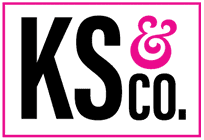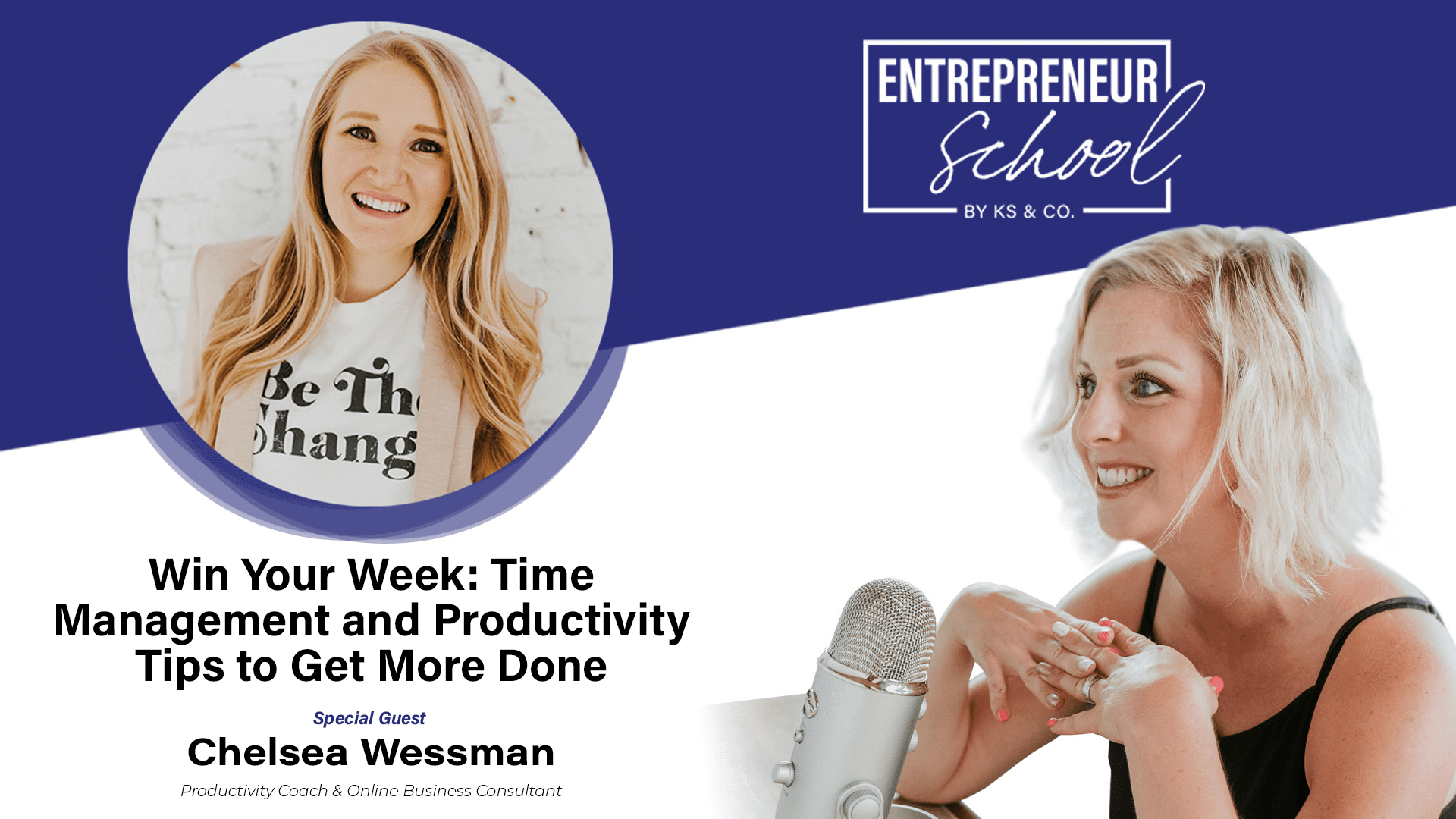This week on Entrepreneur School, we speak with Chelsea Wessman, Productivity Coach & Online Business Consultant. In this workshop, Chelsea will share some strategies for helping entrepreneurs take back their time, make more money without putting in more hours, and create a life and business that aligns with their values.
Chelsea Wessman is a t-shirt and jeans-wearing, popcorn-loving, toddler-wrangling mama of three and wife. As a Productivity Coach & Online Business Consultant, she empowers female entrepreneurs to scale their businesses and optimize their life through her signature one-on-one programs and masterminds. Chelsea is passionate about empowering high-achieving goal-getters to take back their time, embrace progress over perfection, and create a life of freedom and fulfillment without the overwhelm.
Being a business owner is difficult, especially when you are struggling to balance your home and business life. You started your business for freedom, whether it be time freedom, financial freedom, etc. But oftentimes, we get so wound up in work we have no freedom at all.
So today I will be sharing with you some of my strategies for planning and optimizing your work week, and getting back your time.
There’s this hustle culture that we often hear in entrepreneurship, but it’s possible to build a great business without burning yourself into the ground. The business owners that have a personal organization method, as well as optimize their work hours are the most successful. Because the reality is personal organization bleeds into every aspect of your life and Those will bleed into your home, into your family and especially into your business.
First I’m going to walk you through my three-part planning framework designed to help you take back your time by working smarter and not harder. Afterwards, we will talk about optimizing your work hours, and how to get the most done in the time you have.
Weekly planning system
Part one: reflect and redirect
We tend to skip steps as humans, but also as business owners. But we don’t find out until we’re further along in our business; we don’t find out how important the mindset and the reflection piece are.
I’m not saying you have to journal your heart out, but it is essential to take time and reflect and let yourself be present in a moment. You will have a much better idea of where you want to go and how you will get there if you take the time to notice how you got here. You have to ask yourself: how did we get here? Is this where we want to be? If it’s not, we need to do some reflection, right? So essentially what this is, is a journaling practice to set you up for a mindset of success.
There are two questions you are going to answer in your reflection.
1. What went well this week?
Take time to celebrate. One thing I struggled with Is that the minute I hit a goal or I do something awesome, I’ll be like “cool what’s next?” instead of taking time to think about what I did right, and celebrating it. Always make sure that you’re taking time to celebrate the things that went well, especially if you’ve had a crazy week, it can be your saving grace to practice that reflection and gratitude.
2. Takeaways
I want you to think of takeaways as ‘what were the lessons I experienced this week disguised as challenges?’ So “what were the hard things that happened this week, and what was I meant to learn from them?”
Oftentimes it is so easy for us to think of the things that went wrong. Which is fine; It’s good to get those things out, not to dwell on them, but to use them to propel us.
It is so important to take time to reflect. Whether that’s Friday before you close down for the week, whether it’s Saturday, whether it’s Sunday, or when you’re planning for the next week; just take time to review and reflect on your week.
Part Two: developing your plan of action
We’re going to jump into developing your action plan. I’m sure that a lot of us can sympathize with this experience: where you are Just feeling so defeated at the end of the day; you’re drained. You end up feeling burnt out because you are working so hard, and you have nothing to show for it.
There’s a quote that I love; it is “being busy does not mean you are taking care of business.”
So when it comes down to planning your day in a way that makes you feel productive, if you feel like you’re supposed to have all of your tasks crossed off by the end of the day. You’re doing it wrong. A task list is a guideline and not a deadline.
So I am going to share a couple of tips for correctly managing a task list.
I am no different than most people in that, if I don’t write it down, it’s not going to happen. Because I can’t remember all of the things that I have swirling around in my head, and that is the point of a task list. It is to get all of those thoughts and those to-dos out of your head and somewhere else. 3/4 of the overwhelm comes from you just keeping all of that stuff in your head, and you have to try and not forget. It’s impossible. So that’s why we make a task list.
The first way to optimize your task list is to identify your three movers; to identify three things on that list that will make you feel successful at the end of the day. These are not necessarily tasks that feel urgent, these are tasks of high importance. Know what your priorities are and work through those first, because if you can knock out those three movers at the end of every day, whether they are home-related or business-related, you will feel productive, and accomplished.
Effectively using a task list ensures that your actions match what you say you value.
Part Three: Calendaring
The last piece of a weekly planning session is calendaring.
If you do not make a plan for how you’re going to use your time, that’s where the overwhelming feelings come in. High performers are people that have a lot required of them, that have important responsibilities and that operate at a higher level than the average person. These people time block their values into their calendar, not just their appointments.
Basically what this looks like is I scheduled this presentation with Kelly that was on my calendar. But also budgeting. Tonight after my kids go to bed, that me-time is also on my calendar. We need to make sure that we’re putting things in our calendar that take care of us, take care of our family, and take care of our house; not just our business.
Examples of this are movement and exercise. So one of the very first things I do at the beginning of the week is plan out my workouts because my workouts are one thing that it’s really easy to talk myself out of. If we don’t make time for the things that we say we value, there will not be time for them.
If you already know when you’re going to work on what, your brain doesn’t have to worry about if you will have the time to get it done. Focus up, put it in your calendar, block it out, and use that time blocking. Because it eliminates all of the overwhelming stress.
So essentially systems; are just habits and rituals, routines that you go through every day to set yourself up for success, to wind down, clear your mind or practice being present. Those are effective to help you not feel overscheduled. Those are great gifts.
Yeah, it’s an hour. It’s hard to make a habit when you’re not already doing it. But that one hour that I’m asking you to prioritize in your life will give you so many hours’ worth of stress and overwhelmed back. You will get so much time back if you take the time to plan your week before.
Optimizing your work hours
I’m going to talk about getting more done in less time.
Firstly, I want to touch on this topic: Why your planner won’t make you productive.
A planner is not going to make you more productive. Here’s the downside: planners can often make you less productive because you spend so much time filling them out and making them look pretty like those bullet journals. I think they’re beautiful. But If you want to get the most amount of work done in a short amount of time, you have to be succinct.
Next, let’s talk about practicing predictable focus.
Ok, so we have this short window of time. And it’s really hard to focus, especially when we’re so focused on trying to focus.
The first thing you’re going to do when you sit down to work for a window is to prime your environment. Create an environment where you can be successful in your work hours. You’re going to get your tech-ready, you’re going to move your phone out of reach, clear all your tabs except for the ones that you’re gonna be working on, turn off your notifications and get your mind ready.
When I talk about getting your mind ready, I always recommend The book called High-Performance Habits by Brendon Burchard. It is one of my top five books. He walks you through how to reset your brain. So if you’ve just come back from the gym or something, you need to transition from mom’s brain to being a business owner’s brain, they are different and you need to reset. Your brain can focus, it just won’t. All it takes is to just close your eyes for a minute and visualize the outcome that you want for your time.
Lastly, I want to touch on setting your time boundaries.
This is a really good productivity strategy that I even teach my children to get them to clean their room, and just focus. What you do is set a timer, and in that time you can’t do anything but the tasks that you’re working on; nothing until that timer goes off.
Here’s the beautiful bonus to this tactic. One, it helps us get things done because we have something keeping us accountable. But two is that often by the time that that alarm goes off, you are in flow mode and you can usually keep on going with your productivity. It puts you into this setting where you are on a roll and want to keep going. All you need to do is start.
I hope that these strategies for planning your week in the right way, and getting the most productivity out of your hour can transform your mindset, create new habits, and allow you to spend more time doing the things you love outside of work.
One thing I want you to understand is willpower or self-discipline is a muscle, it’s not a characteristic that you either have or you don’t have. The ability to focus is a muscle; it’s something that must be worked and it’s something that must be practiced.
These strategies all make magic together, but new habits don’t form overnight, So what I would rather you start somewhere instead of going big and trying to take on an entirely new routine. I would prefer that you just choose one thing that I talked about today that you feel will make the biggest difference for you, and that feels sustainable.
Check out our freebies page for some exclusive content from Chelsea!
Follow Chelsea on TikTok
Follow Chelsea on Instagram
Visit Chelsea’s Blog







